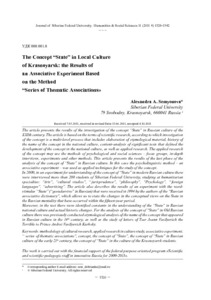Концепт «государство» в красноярской культуре: результаты ассоциативного эксперимента по методике «Серия тематических ассоциаций»
Скачать файл:
URI (для ссылок/цитирований):
https://elib.sfu-kras.ru/handle/2311/2563Автор:
Семенова, А.А.
Semyonova, Alexandra A.
Дата:
2011-11Аннотация:
The article presents the results of the investigation of the concept State in Russian culture of the
XXIth century. The article is based on the terms of scientific research, according to which investigation
of the concept is a multi-level process that includes elaboration of etymological material, history of
the name of the concept in the national culture, content-analysis of significant texts that defined the
development of the concept in the national culture, as well as applied research. The applied research
of the concept may use the methods of psychological and social sciences - focus groups, in-depth
interviews, experiments and other methods. This article presents the results of the last phase of the
analysis of the concept of State in Russian culture. In this case the psycholinguistic method - an
associative experiment - was used as applied techniques for the study of the concept.
In 2009, in an experiment for understanding of the concept of State in modern Russian culture there
were interviewed more than 200 students of Siberian Federal University, studying at humanitarian
specialties: Arts, cultural studies, jurisprudence, philosophy, Psychology, foreign
languages, advertising. The article also describes the results of an experiment with the wordstimulus
State (gosudarstvo in Russian) that were received in 1994 by the authors of the Russian
associative dictionary, which allows us to state the changes in the conceptual views on the State in
the Russian mentality that have occurred within the fifteen-year period.
Moreover, in the text there were identified constants in the understanding of the State in Russian
national culture and actual historic changes. For the analysis of the concept of State in Old Russian
culture there was previously conducted etymological analysis of the name of the concept that appeared
in Russian culture in the 14th century, as well as the study of letters of Tsar Joann Vasilyevich the
Terrible to Prince Andrei Vasilyevich Kurbsky. В настоящей статье представлены результаты исследования концепта «государство» в
российской культуре XXI века. Статья базируется на положениях научного исследования,
согласно которому исследование концепта является многоуровневым процессом, включающим в себя проработку этимологического материала, историю существования имени концепта
в национальной культуре, контент-анализ значимых текстов, определивших становление
определенного концепта в национальной культуре, а также прикладное исследование. В
качестве прикладного исследования концепта могут быть применены методы психологических
и социальных наук - фокус-группы, глубинные интервью, эксперименты и другие методы.
В настоящей статье представлены результаты последнего этапа анализа концепта
«государство» в российской культуре. В данном случае в качестве прикладной методики
для исследования концепта выступил психолингвистический метод - ассоциативный
эксперимент.
В 2009 году в эксперименте на понимание содержания концепта «государство» в
современной российской культуре приняло участие более 200 студентов Сибирского
федерального университета, обучающихся на гуманитарных специальностях:
«искусствоведение», «культурология», «юриспруденция», «философия», «психология»,
«иностранный язык», «реклама». Также в статье приведены результаты ассоциативного
эксперимента со словом-стимулом «государство», которые были получены в 1994 году
авторами «Русского ассоциативного словаря», что позволяет зафиксировать изменения в
концептуальных представлениях о государстве в российском менталитете, произошедшие
за пятнадцатилетнюю эпоху.
Кроме того, в тексте выявлены константы в понимании «государство» в российской
национальной культуре и свершившиеся актуально-исторические изменения. Для анализа
концепта «государство» в древнерусской культуре ранее был привлечен этимологический
анализ имени концепта, возникшего в русской культуре в XIV веке, а также исследование
писем царя Иоанна Васильевича Грозного к князю Андрею Курбскому.
Коллекции:
Метаданные:
Показать полную информациюСвязанные материалы
Показаны похожие ресурсы по названию, автору или тематике.
-
«Concept» Notion as the Base of Contemporary Culture Studies
Semyonova, Alexandra A.; А.А. Семёнова (Сибирский федеральный университет. Siberian Federal University, 2009-05)The article is devoted to the topical notion of contemporary human science – «concept». The main aim of this research work is the problem of methodology of research on concepts at culture studies and discovery of mechanisms ... -
Socio-Philosophical Analysis of the Basic Concepts Outlined in His Treatise Tao Te Ching, Based on the Author’s Translation-Interpretation
Sorokopud, Sergey N.; Сорокопуд, С.Н. (Сибирский федеральный университет. Siberian Federal University., 2014-01)The article presents the results of a new (authorized) translation of the ancient Chinese text by Lao Tzu Tao Te Ching. This ancient text in the world of science is a representative of basic concepts of Chinese culture, ... -
Basic Concepts of Chinese National Religious and Philosophical Doctrines: an Introduction to Social Philosophical Study of Chinese Society
Sorokopud, Sergey N.; Сорокопуд, С.Н. (Сибирский федеральный университет. Siberian Federal University., 2014-03)The notion of basic concept of culture is substantiated in the article. A new definition of the concept is given. The history of formation of the notion concept, its differences from the category and concepts are previously ... -
Visualization of the Concept of State in the Architecture of the Moscow Cathedral of the Intercession on the Moat (1555–1561)
Sitnikova, Alexandra A.; Zhukovsky, Vladimir I.; Ситникова, А.А.; Жуковский, В.И. (Сибирский федеральный университет. Siberian Federal University, 2018-09)The article presents the result of a philosophical and art criticism analysis of some elements of the Moscow Cathedral of the Intercession on the moat (1555–1561), also known as St. Basil’s Cathedral. This analysis is part ... -
Semiotic Development Potential of Henry Lawson’s Individual Concept “Mate/Mateship”
Dobryaeva, Irina S.; Добряева, И.С. (Сибирский федеральный университет. Siberian Federal University., 2016-03)The paper envisages semiotic development potential of semantic structure of individual concept “Mate” created by Henry Lawson. The image in question is iconic for Australian culture. A certain share of idealization and ...

